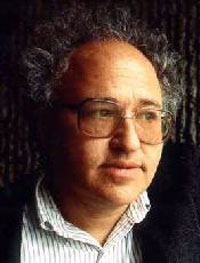Vous pouvez contribuer simplement à Wikibéral. Pour cela, demandez un compte à adminwiki@liberaux.org. N'hésitez pas !
David Friedman
| David Friedman | |||||
| Économiste | |||||
|---|---|---|---|---|---|
| Dates | Né en 1945 | ||||

| |||||
| Tendance | Anarcho-capitaliste | ||||
| Nationalité | |||||
| Articles internes | Autres articles sur David Friedman | ||||
| Citation | |||||
| Interwikis sur David Friedman | |||||
David D. Friedman (né le 12 février 1945) est professeur à l'Université de Santa Clara où il enseigne l'économie et le droit. Cet auteur est devenu une importante figure anarcho-capitaliste, par la publication de son livre The Machinery of Freedom (1971) (trad. française Vers une société sans État, 1992, les Belles Lettres). Diplômé en Sciences physiques de l'Université de Chicago, il est le fils du Prix Nobel Milton Friedman et le père de Patri Friedman.
Ne pas confondre avec David M. Friedman, avocat américain, nommé par Donald Trump ambassadeur des États-Unis en Israël en décembre 2016.
C'est un éditeur associé de Liberty Magazine.
Publications
- 1971, The Machinery of Freedom, Guide to a Radical Capitalism, La Salle, Illinois, Open Court
- Nouvelle édition en 1973
- Nouvelle édition en 1989
- Traduction en français en 1992 par F. Liégeois, Vers une société sans État, Les Belles Lettres, collection "Laissez-faire"
- Traduction italienne en 1997, L’ingranaggio della libertà. Guida a un capitalismo radicale, Macerata, liberilibri
- Nouvelle édition en 2005
- Traduction en portugais, "As engrenagens da liberdade. Guia para um capitalismo radical"
- 1977, "A Theory of the Size and Shape of Nations," Journal of Political Economy 85 (février 1977): 59-77, les limites de l'accroissement de la taille d'une nation en raison du désir de l'État de maximiser ses recettes fiscales
- 1979, Private Creation and Enforcement of Law: A Historical Case, Journal of Legal Studies, mars, Vol 8, pp399–415
- 1980,
- a. Many, Few, One -- Social Harmony and the Shrunken Choice Set, American Economic Review, vol. 70, no. 1 (mars), pp225-232
- b. In Defense of Thomas Aquinas and the Just Price, History of Political Economy, 12(2), été
- 1985, "Comment" on Ezra J. Mishan, "Religion, Culture, and Technology", In: Walter Block, Geoffrey Brennan,Kenneth Elzinga, dir., "Morality of The Market: Religious and Economic Perspectives", Vancouver Fraser Institute, pp313-321
- 1986, Price Theory - An Intermediary Text, Cincinnati, South-Western Publishing Co.
- 2nde édition en 1992, Cincinnati, South-Western Publishing Co.
- 1987, Comment - Problems in the Provision of Public Goods, 10, Harvard Journal of Law & Public Policy, pp505-520
- 1988, The Trouble with Hoppe, Liberty, November, pp53–54
- 1993, avec Stephen J. Schulhofer, Rethinking Indigent Defense: Promoting Effective Representation through Consumer Sovereignty and Freedom of Choice for all Criminals, American Criminal Law Review, Vol 31, Fall, pp73–122
- 1994, Law as a Private Good: A Response to Tyler Cowen on the Economics of Anarchy, Economics and Philosophy, vol 10, pp319–27
- 1996, Hidden Order: The Economics of Everyday Life, New York, HarperBusiness
- 1998, "Richard Posner", In: "The New Palgrave Dictionary of Law and Economics", New York: Stockton Press
- 2000, "Law's Order - What Economics Has to Do with Law and Why It Matters", Princeton, Princeton University Press
- 2006,
- a. Law as a Private Good: A Response to Tyler Cowen on the Economics of Anarchy, In: Edward P. Stringham, Dir., Anarchy and the Law. The Political Economy of Choice, Ch 16, Cheltenham UK: Edward Elgar
- b. Private Creation and Enforcement of Law: A Historical Case, In: Edward P. Stringham, Dir., Anarchy and the Law. The Political Economy of Choice, Ch 36, Cheltenham UK: Edward Elgar
- 2007,
- « Crime », In The Concise Encyclopedia of Economics, ed. David R. Henderson (Indianapolis, IN : Liberty Fund, 2007), 104-107 [lire en ligne]
- Traduction en français le 24 décembre 2012, « Crime »
- « Crime », In The Concise Encyclopedia of Economics, ed. David R. Henderson (Indianapolis, IN : Liberty Fund, 2007), 104-107 [lire en ligne]
Littérature secondaire
- 1978, John Chamberlain, commentaire du livre de David Friedman, "The Machinery of Freedom: Guide to a Radical Capitalism "], The Freeman, novembre, Vol 28, n°11
- 1990,
- Rob Michels, "commentaire du livre de" David Friedman, "The Machinery of Freedom: Guide to a Radical Capitalism", Extropy, Vol 6, Summer, pp34-35
- Max More, "commentaire du livre de" David Friedman, "The Machinery of Freedom: Guide to a Radical Capitalism", Extropy, Vol 6, Summer, p35
- 1994, Wayne Dawson, commentaire du livre de David Friedman, "The Machinery of Freedom: Guide to a Radical Capitalism", Formulations (publication de la Free Nation Foundation), Vol 1, n°4, Summer
- 1997, Fabio Massimo Nicosia, "David Friedman, realista giuridico libertario", In: Fabio Massimo Nicosia, dir., Il diritto di essere liberi. Per una teoria libertaria della secessione, della proprietà e dell’ordine giuridico, Treviglio, Leonardo Facco Editore, pp88-97
- 2001, Charles Baird, Commentaire du livre de David Friedman, "Law's Order: What Economics Has to Do with Law and Why It Matters"], The Freeman, Mars, Vol 51, n°3
- 2008, Bryan Caplan, "Friedman, David (1945– )", In: Ronald Hamowy, dir., "The Encyclopedia of Libertarianism", Cato Institute - Sage Publications, pp214-215
Citation
- « Ne demandez pas ce que l’État peut faire pour vous. Demandez ce que les hommes de l'État sont en train de vous faire ». (Vers une société sans État)
Liens externes
| Vers Une Société Sans État (for) | |
Web textes
- (en)Site de David Friedman
- (en)Ideas : son blog
- (en)E-commerce et Cyberespace : pourquoi les États ne doivent pas s'en mêler sur Euro 92
- (en)Wikipedia
Liens vidéos
- "The Seasteading Institute" Conférence de David D. Friedman en 2009 (Durée 27 mins 56)
| Accédez d'un seul coup d’œil à toute la série des articles de Wikibéral concernant les célébrités libérales, libertariennes et assimilées. |
| Accédez d'un seul coup d’œil au portail économie. |
| Accédez d'un seul coup d’œil au portail des grands auteurs et penseurs du libéralisme. |